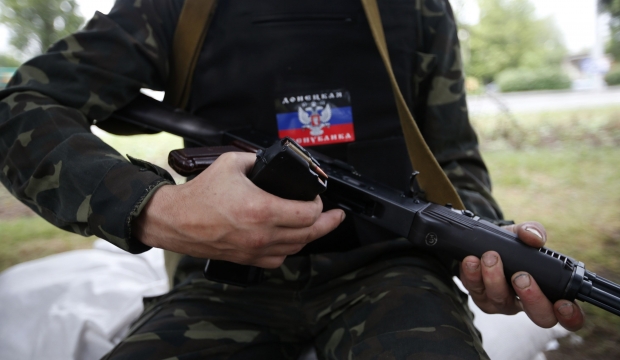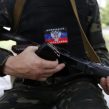
Moscow Dismisses Western Sanctions, as Fighting in Donbas Intensifies
Publication: Eurasia Daily Monitor Volume: 11 Issue: 140
By:

This week, the United States and the European Union imposed long-awaited and feared punitive economic sanctions aimed at sectors of the Russian economy and designed to change President Vladimir Putin’s policies on Ukraine. But in Moscow, they are seen as lopsided and largely ineffective. The Russian stock exchange and the ruble rebounded sharply after experts and investors evaluated the true extent of the announced measures. The access of several major Russian state-controlled banks (VTB, Bank Moskvi and Rossekhozbank) to Western money markets will be limited, but the Russian Central Bank has already promised to make up any losses they may encounter. In fact other smaller private banks in Russia, not sanctioned by the West, may indeed suffer because of limited access to liquidity, as the Central Bank funnels money into sanction-hit state-owned financial institutions (RBCdaily, July 31).
The announced ban on the supply of Western technologies for offshore oil drilling could seriously hamper plans to develop oil extraction in the Arctic and off Sakhalin Island. But again, the Western bark is loud, while the bite is insignificant. State-owned oil major Rosneft has been actively perusing the development of oil deposits in the Russian Arctic as a commercial and geopolitical project to extend Russia’s sphere of influence to the North Pole. Without Western know-how, apparently banned under the latest round of sanctions, offshore drilling in the Arctic seems impossible, but the projects will apparently go ahead anyway. The Russian press enthusiastically reported a $4.25 billion contract between Rosneft and Norwegian-based North Atlantic Drilling Ltd. to provide six drilling platforms and expertise through 2022 to drill for oil in the Arctic under an agreement between Rosneft and ExxonMobil. The contract was signed on July 29, and will not be affected by US or EU sanctions, which do not apply to contracts signed before August 1 (Interfax, July 31).
The official government daily Rossiyskaya Gazeta quotes the Russian Ministry of Foreign Affairs: “The West imposes sanctions to change our policies, but we will not yield.” According to an official foreign ministry statement, “Europe is following orders from Washington against its own interests.” It is believed in Moscow that those European self-interests will soon prevail: The announced EU sanctions aimed at Russian banks and the defense industry have a short initial duration of only three months and, according to Rossiyskaya Gazeta, may be called off if EU member states begin to suffer economically. According to Deputy Foreign Minister Grigoriy Karasin, “Sanctions will make Russia stronger, its economy more effective and its society monolithic” (Rossiyskaya Gazeta, July 31).
In a sign of further defiance of Western attempts to use sanctions, Moscow has begun to push back by banning imports of Western produce. Moscow has banned nearly all fruit and vegetable imports from Poland, worth over a billion euros a year, citing health concerns; and it has threatened to ban meat, fruit and vegetable imports from other EU countries as well as poultry from the US (Interfax, July 30). Food imports from Ukraine are being banned, and there are threats to impose punishing tariffs on all trade with Ukraine (Interfax, July 31).
The Russian state-run propaganda machine is running with superb efficiency. Most of the Russian public sees the conflict in Ukraine in a totally different light than the rest of the world. According to a recent poll by the independent pollster Levada Tsentr, the vast majority of Russians (82 percent) believe the Ukrainian military shot down the Malaysian passenger jet Flight MH17, which crashed in the eastern Ukrainian region of Donbas on July 17, killing 298 people. US intelligence indicates Flight MH17 was hit by a surface-to-air BUK M1 missile (known in the West as the SA-11 “Gadfly”), fired from separatist-controlled territory and possibly provided by Russia or made operational with Russian technical assistance. In Russia, 46 percent believe Flight MH17 was hit by a Ukrainian surface-to-air missile, while 36 percent think a Ukrainian military jet shot the Malaysian airliner out of the sky. Only 3 percent blame the separatist rebels and 1 percent—the Russian military. According to Levada Tsentr, the Russian public has been thoroughly brainwashed and is ready to believe any falsehood the Russian state propaganda fancies to produce (Levada Tsentr, July 30). The Russian military and Russian state-controlled media have been blaming the Ukrainians for shooting down Flight MH17 (see EDM, July 24). A majority of the listeners (78 percent) of the liberal radio outlet Ekho Moskvi voted in a phone in: “Russia is more to blame” in the downing of Flight MH17, while 22 percent believe “Ukraine is more to blame” (Ekho Moskvi, July 21). The better-informed liberal audience of Ekho Moskvi seems to compose a slim minority within Russia.
Putin has demanded that components made in the West and Ukraine used by the Russian defense industry must be replaced with domestically produced items: “We can surely do it all ourselves, absolutely anything” (kremlin.ru, July 28). The deputy prime minister in charge of the defense industry, Dmitry Rogozin proclaimed: “In two and a half, or three years max, we will replace it all—we will depend only on ourselves" (Interfax, July 31).
In the fighting in Donbas between Russia-supported rebels and Ukrainian government forces, a critical moment seems to be approaching. Despite increasingly heavy covert Russian support, the rebels are slowly losing ground. The Ukrainian forces are attempting to push through from north to south, cutting the rebel enclave in half, severing Donetsk from Luhansk and from supplies coming over the Russian border. The Ukrainian offensive has met stiff resistance; the fighting has been heavy, but the badly organized rebels seem incapable of launching a decisive counteroffensive. In Kiev, most observers believe the battle is in its final stages (Nezavisimaya Gazeta, July 27). The Ukrainian Chief of the General Staff Victor Mudzenko told journalists: “major combat may be over in less than a month” (Novoye Vremya, July 29).
Attempts to introduce a Moscow-sponsored permanent ceasefire in Donbas have failed up to now. Without a ceasefire or the introduction of regular Russian troops in Donbas in some form, the unruly rebels seem doomed. Will Putin allow the Donbas rebellion to collapse? In deciding his next move in the Ukrainian crisis, Putin will not be restricted by any significant internal opposition, and the effective weight of Western so-called targeted sanctions seems questionable.




